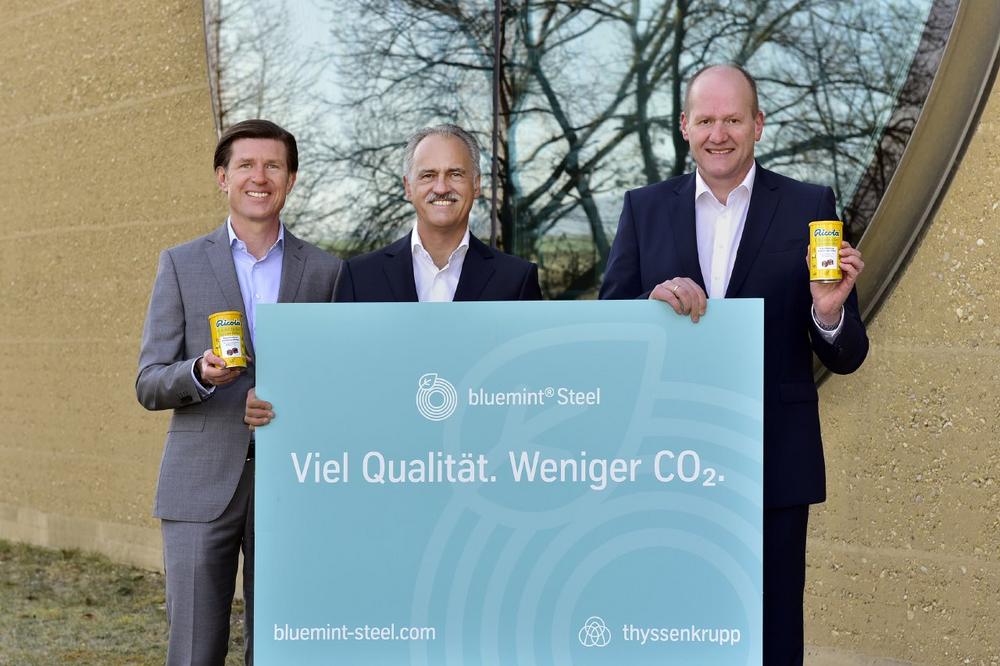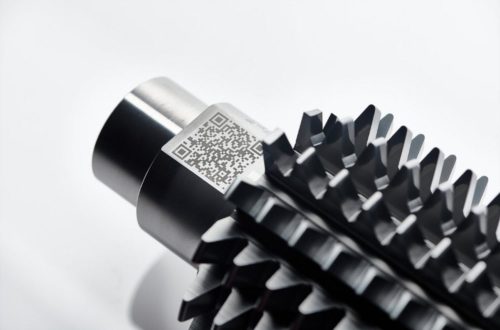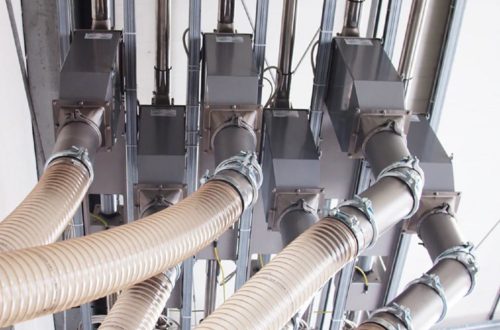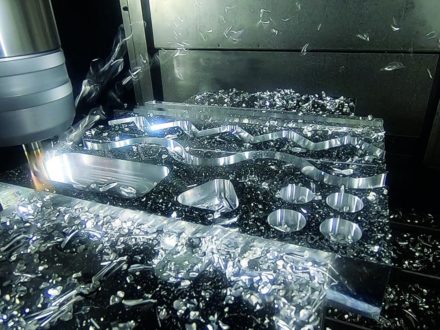
Innovation: First food can with reduced CO2 intensity
In the joint project, thyssenkrupp Rasselstein supplies the CO2-reduced packaging steel, Hoffmann Neopac produces and prints the cans using solar power, and Ricola relies on energy from renewable sources for the production and filling of their herbal drops.
Use of new bluemint® Steel
“By using our new bluemint® Steel, CO2 emissions from can production can be significantly reduced,” explains Dr. Peter Biele, CEO of thyssenkrupp Rasselstein, “making our product even more sustainable.” The German tinplate manufacturer produced tinplate from bluemint® Steel for the first time. In the process of steel production, so-called HBI was used, i.e. already reduced sponge iron. This reduces the use of coal for the reduction process in the blast furnace. The result is a real and globally effective reduction in CO2 emissions. “This project is an important step towards achieving our climate targets,” says Biele. thyssenkrupp Steel Europe has pledged to be completely climate neutral by 2045.
“We are pleased to have found partners in these two companies working with us on climate-friendly products,” emphasizes Biele.
Can production with 100 percent electricity from renewable source
“Sustainability is at the heart of everything we do. We produce our cans in Switzerland with 100 percent electricity from renewable sources while working on our own decarbonization program,” adds Mark Aegler, CEO of Hoffmann Neopac. This also saves CO2 in the can production.
CO2-reduced packaging as a further step towards sustainability
For us, it was important to make the packaging of our herbal drops more sustainable. That is why we are the first company in our market to use CO2-reduced food cans,” says Dr. Martin Messerli, Chief Operating Officer of Ricola.
For decades, sustainable thinking and action have formed an important decision-making basis for Ricola’s corporate management. Since 2016, the Swiss herbal drops manufacturer has been producing with electricity from hydropower. From the Ricola Group’s point of view, the next logical step was to optimize the supply chain and the packaging of the herbal drops.
“By switching to a CO2-reduced can for our herbal drops specialties, Ricola is also responding to increased demand from consumers, who are paying more attention to the carbon footprint of their purchases,” says Messerli.
The first herbal drops in the CO2-reduced can leave the factory in Laufen at the beginning of March and will be available in stores from April/May.
About thyssenkrupp Rasselstein:
thyssenkrupp Rasselstein GmbH is a leading global supplier of high-quality, precision-made packaging steel. The site in Andernach – the world’s biggest production site of its kind – produces 1.5 million tons of packaging steel each year. The plant’s 2,400 employees serve around 400 customers from numerous markets in 80 countries – from producers of food and pet food cans to manufacturers of beverage and aerosol cans, containers for chemical products, and bottle caps. Expert service, sales, and aftersales teams round out the product portfolio. They work closely with customers to maintain consistently high standards of quality and reliability worldwide.
About Hoffmann Neopac
Hoffmann Neopac is a privately owned company headquartered in Thun, Switzerland. The group produces high-quality metal and plastic packaging at six locations: HOFFMANN cans in Thun and in Holland; Polyfoil® and plastic tubes at NEOPAC in Switzerland, Hungary and the USA, and 3D Neopac in India. Long-standing customers include pharmaceutical, cosmetics and consumer goods manufacturers in the markets of Europe, North America and Asia. HOFFMANN employs about 150 people with a capacity of 400 million cans. The company attaches great importance to the sustainability of its manufacturing processes and organizational culture and includes a particularly environmentally conscious packaging portfolio in its range. For more information, visit www.hoffmann.ch.
About Ricola
Ricola is one of the most modern and innovative candy manufacturers in the world. The company exports herbal specialties to more than 45 countries and is known worldwide for the best Swiss quality. Founded in 1930, with headquarters in Laufen near Basel and subsidiaries in Europe, Asia and the USA, Ricola now produces around 60 varieties of herbal candies and tea specialties. The family-owned company is regarded in Switzerland as a pioneer in the cultivation of herbs and attaches great importance to selected locations and controlled environmentally friendly cultivation. Ricola has concluded fixed supply contracts with nearly 100 farmers from the Swiss mountain region. Ricola is committed to economically, socially and ecologically sustainable corporate management and is a responsible employer. The combination of the traditional values of a family-owned company with quality awareness and innovative spirit is what makes the Swiss top brand so successful.
thyssenkrupp Steel Europe AG
Kaiser-Wilhelm-Str. 100
47166 Duisburg
Telefon: +49 (203) 52-0
Telefax: +49 (203) 52-25102
http://www.thyssenkrupp-steel-europe.com
Head of Communications
Telefon: +49 (2632) 3097-2764
E-Mail: carmen.tschage@thyssenkrupp.com
Communications + Market Development
Telefon: +49 (2632) 3097-2265
Fax: +49 (2632) 3097-152265
E-Mail: Nicole.Korb@thyssenkrupp.com
![]()



